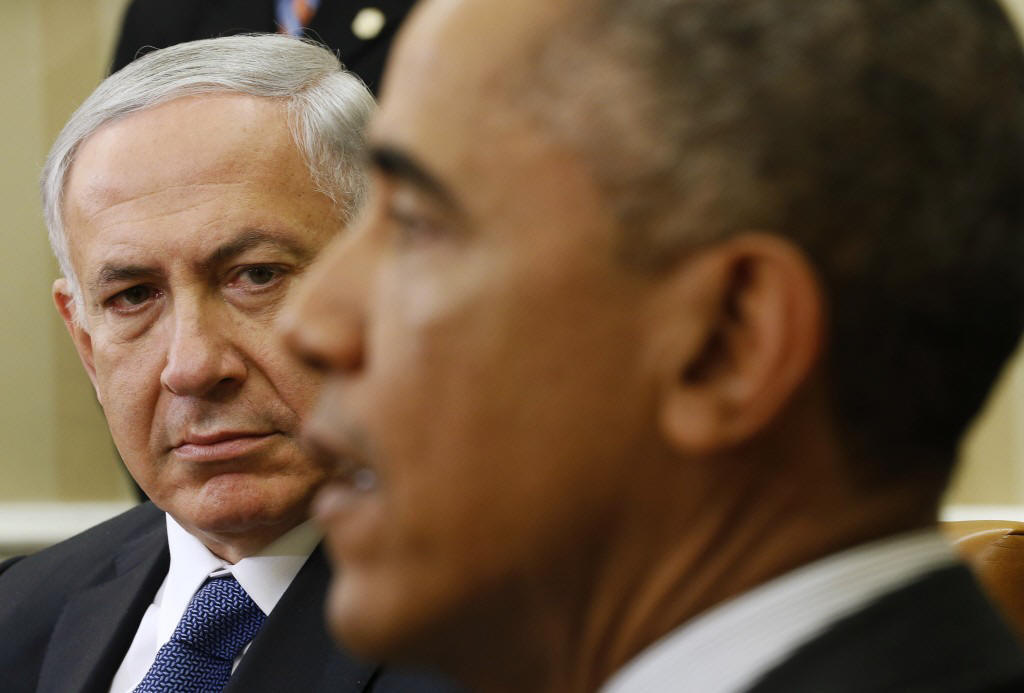www.aljazeerah.info
News, March 2015
Archives
Mission & Name
Conflict Terminology
Editorials
Gaza Holocaust
Gulf War
Isdood
Islam
News
News Photos
Opinion Editorials
US Foreign Policy (Dr. El-Najjar's Articles)
www.aljazeerah.info
|
Editorial Note: The following news reports are summaries from original sources. They may also include corrections of Arabic names and political terminology. Comments are in parentheses. |
Emperor Netanyahu Arrives in the US, Using Boehner's Unconstitutional Invitation, in Defiance to the Obama Administration
March 2, 2015
Editor's Note:
The Israeli prime minister, Benjamin Netanyahu, has arrived in the U.S. despite objections from the Obama administration, on the basis that he is using the visit and his speech in Congress to serve his re-election campaign, just two weeks before the Israeli elections.
The Speaker of the US House of Representative, John Boehner, invited Netanyahu to make this speech without consulting with the White House or the State Department, which is an unprecedented violation of the US Constitution, as foreign policy is the realm of the executive branch of government.
Netanyahu will first give a speech before his staunchest supporters today, Monday, March 2, 2015, at AIPAC, the strong Jewish American organization, which controls members of the US Congress and influences various aspects of life in the US.
Tomorrow, Netanyahu will give his controversial speech before the two chambers of the US Congress, whose members have been threatened by Sheldon Adelson to be punished if they would not attend the Netanyahu speech session.
It's unknown yet how many standing ovations AIPAC has decided for members of Congress to make! During his previous speech to Congress, Netanyahu got 29 standing ovations from the Congressional robots.
Is he going to get more standing ovations, in yet more humiliation to the members of Congress and the Obama administration?
We'll see tomorrow!
Anyway, the point has been made: Netanyahu is the Emperor, who cannot be seriously opposed or stopped by anybody in the US government, whether in the White House or in Congress!
As for John Boehner, he proved to be a "smart" politician, who knows who is the real boss to be served, even by committing unconstitutional acts!
He has already gained pleasure from both the Emperor and his AIPAC operatives!
Amazing (and amusing) times, indeed!
 |
|||||||||||
Benjamin Netanyahu, gearing up to address the US Congress on March 3, 2015, asserting himself as the De Facto Emperor of the Zionist Empire, and celebrating his war crimes and crimes against humanity he committed in Gaza last summer (See below). |
|||||||||||
|
|||||||||||
|
More of Butcher Netanyahu's war crimes and crimes against
humanity in Gaza: |
 |
 |
| President Barack Obama (R) meets with Israeli Prime Minister Benjamin Netanyahu at the White House in Washington, October 1, 2014. | House Speaker John Boehner listens as President Barack Obama hosts a bipartisan meeting of congressional leaders in the White House in Washington, January 13, 2015 |
U.S. Congress Considers Appointing Netanyahu Emperor of the Republic for Life
Posted by Johnny Punish
Veterans Today, on January 24, 2015
Boehner and Netanyahu Conspire to Violate Logan Act
Admittedly the title herein is a bit inflammatory but its meant to highlight a very serious fact that the Speaker of our House John Boehner has invited Israeli Prime Minister Benjamin Netanyahu to lecture We-The-People on foreign policy as it relates to our U.S. Presidents Iran policy on February 11.
It should be a huge event. I hear he’s invited all the networks to play it live for We-The-People so that Bibi can promote his own Foreign Policy against the official U.S. position at the White House which may be in direct violation of The Logan Act
The Logan Act is a United States federal law that forbids unauthorized citizens from negotiating with foreign governments. It was passed in 1799 and last amended in 1994. Violation of the Logan Act is a felony, punishable under federal law with imprisonment of up to three years.
The Act was intended to prohibit United States citizens without authority from interfering in relations between the United States and foreign governments.
At this time, to the best of our knowledge Bibi may have received American citizenship during his study years at MIT and has never renounced it. We tried to confirm this information but neither his office or the U.S. government will confirm or deny!
If a U.S. citizen, as such, he will be in direct violation of the Logan Act; plain and simple! There is NO way around it! Nentanyahu is NOT a member of the U.S. Government and has no rights to promote and negotiate foreign policy for our government.
Gaza Children Murders 2014 courtesy of Benjamin Netanyahu and his crazy genocidial maniacs in $ 10,000 suits
Now of course, Netanyahu could care less about rule of law. He lives in a world of impunity protected by massive money in the corridors of power where one can murder over 500 children, over 1500 civilians, and murder 17 journalists in Gaza this past summer and get away with it while he marches in the Je Suis Charlie parade in Paris last week.
There is NOTHING this psychopath won’t do! He has no shame or conscience. He is evil incarnate; plain and simple! So don’t hold your breath on getting our paid off Congress to take action. They are more likely to give him a standing ovation and appoint him U.S. President for Life ala and change his title to Emperor Netanyahu.
Now are we going to put a stop this maniac or are we going to follow His Lowness and give him a standing ovation as our de-facto elect him U.S. President?
Netanyahu arrives in U.S., signs of easing of tensions over Iran speech
By Matt Spetalnick and Dan Williams
WASHINGTON Mon Mar 2, 2015 8:31am EST
WASHINGTON (Reuters) -
The United States and Israel showed signs of seeking to defuse tensions on Sunday ahead of a speech in Washington by Israeli Prime Minister Benjamin Netanyahu when he will warn against a possible nuclear deal with Iran.
Policy differences over the negotiations with Iran remained firm, however, as Netanyahu arrived in the United States on Sunday afternoon for a speech to Congress, which has imperiled ties between the two allies.
Israel fears that U.S. President Barack Obama's Iran diplomacy, with an end-of-March deadline for a framework accord, will allow its archfoe to develop atomic weapons, something Tehran denies seeking.
By accepting an invitation from the Republican Party to address Congress on Tuesday, the Israeli leader infuriated the Obama administration, which said it was not told of the speech before plans were made public in an apparent breach of protocol.
A senior Israeli official told reporters on Netanyahu's flight that Congress could be "the last brake" for stopping a nuclear deal with Iran.
Saying it was Israel's impression that members of Congress "do not necessarily know the details of the deal coming together, which we do not see as a good deal," the official said Netanyahu in his speech would give a detailed explanation of his objections to an Iran deal.
U.S. Secretary of State John Kerry reiterated Washington's determination to pursue negotiations with Iran, saying on Sunday the United States deserved "the benefit of the doubt" to see if a nuclear deal could be reached.
Last week, Obama's national security adviser, Susan Rice, said the partisanship caused by Netanyahu's looming address was "destructive to the fabric of U.S.-Israeli ties".
Asked about this on the ABC program "This Week", Kerry said: "The prime minister of Israel is welcome to speak in the United States, obviously. And we have a closer relationship with Israel right now in terms of security than at any time in history."
'POLITICAL FOOTBALL'
He said he talked to Netanyahu on Saturday, adding: "We don't want to see this turned into some great political football." Israel and the United States agreed that the main goal was to prevent Iran from getting a nuclear weapon, he said.
The senior Israeli official said the Netanyahu-Kerry conversation "shows the relationship continues."
In remarks on Saturday at Jerusalem's Western Wall, Netanyahu said: “I would like to take this opportunity to say that I respect U.S. President Barack Obama.” He added that he believed in the strong bilateral ties and said, "that strength will prevail over differences of opinion, those in the past and those yet to come.”
Netanyahu did not repeat those remarks as he departed on Sunday. The Israeli prime minister, who is running for re-election in a March 17 ballot, has framed his visit as being above politics and he portrayed himself as being a guardian for all Jews.
"I’m going to Washington on a fateful, even historic, mission," he said as he boarded his plane in Tel Aviv. "I feel that I am an emissary of all Israel's citizens, even those who do not agree with me, and of the entire Jewish people," he told reporters.
Netanyahu is expected to use his speech to urge Congress to approve new sanctions against Iran despite Obama's pledge to veto such legislation because it would jeopardize nuclear talks.
U.S. officials fear he is seeking to sabotage the Iran diplomacy, and critics have suggested his visit is an elaborate election stunt that will play well with voters back home.
With Obama past the midpoint of his final term, his aides see an Iran nuclear deal as a potential signature achievement for a foreign policy legacy notably short on major successes.
While White House and Israeli officials insist that key areas of cooperation, from counterterrorism to intelligence to cyber security, will remain unaffected, the divide over the Iran talks has shaped up as the worst in decades.
Previously, Israel has always been careful to navigate between the Republican and Democratic camps. The planned address, however, has driven a rare wedge between Netanyahu's government and some congressional Democrats. Some two dozen or more of them plan to boycott the speech, according to unofficial estimates.
IRANIAN ACCUSATION
Speaking in Tehran on Saturday, Iranian Foreign Minister Mohammad Javad Zarif accused Netanyahu of trying to undermine the nuclear talks in order to distract from the Palestinians' unresolved bid for an independent state.
"Netanyahu is opposed to any sort of solution," Zarif said.
Hard-line U.S. supporters of Israel say Netanyahu must take center-stage in Washington to sound the alarm over the potential Iran deal, even at the risk of offending long-time supporters.
But a U.S. official, speaking on condition of anonymity, said the "politicized" nature of his visit threatened "what undergirds the strength of the relationship".
As one former U.S. official put it: "Sure, when Netanyahu calls the White House, Obama will answer. But how fast will he be about responding (to a crisis)?"
Last month, U.S. officials accused the Israeli government of leaking information to the Israeli media to undermine the Iran negotiations and said this would limit further sharing of sensitive details about the talks.
"What the prime minister is doing here is simply so egregious that it has a more lasting impact on that fundamental underlying relationship," said Jeremy Ben-Ami, head of J Street, a liberal pro-Israel lobbying group aligned with Obama’s Iran policy.
Netanyahu will address the influential pro-Israel lobby AIPAC on Monday. Even as he makes his hard-line case against Iran, he is expected to try to keep tensions from spiraling, mindful that Israelis are wary of becoming estranged from their superpower ally.
(Additional reporting by Patricia Zengerle, Mark Hosenball and Dan Williams in Washington and Ori Lewis in Jerusalem; Editing by Jeffrey Heller, Frances Kerry, Crispian Balmer, Susan Fenton and Eric Walsh)
Netanyahu invite is a symptom of Boehner’s grudge match against the U.S. Constitution
By Elizabeth Cobbs Hoffman
Reuters, March 2, 2015
House Speaker John Boehner’s annoyance with President Barack Obama is turning into a grudge match against the Constitution.
His decision to invite a foreign head of government to address Congress without first consulting the sitting president has no precedent in American history. And for a simple reason. It’s unconstitutional.
Boehner (R-Ohio) fully admits that his failure to communicate with the White House was not an oversight. Like a schoolboy passing notes when the teacher turns to the blackboard, he sneaked behind Obama’s back to set the date for Israeli Prime Minister Benjamin Netanyahu’s speech with his country’s ambassador to the United States. Boehner asked the foreign dignitary not to tell the U.S. president.
“I wanted to make sure,” Boehner later explained on Fox News, “there was no interference.” Netanyahu is now scheduled to address a joint session of Congress on March 3.
This is unheard of in U.S. history. American Congresses have sometimes rejected a president’s foreign policy, of course. That is within their rights.
Though the president has the power to negotiate agreements with foreign countries, the Senate can reject or approve them. President Woodrow Wilson, for example, journeyed to Paris in 1919 to negotiate the Treaty of Versailles after World War One. Wilson was instrumental in writing the treaty, particularly those sections that created a new institution, the League of Nations, to provide collective security.
When Wilson returned home, he conducted a whistle-stop campaign across the country to build support for the new league. But to no avail. The Senate was under the sway of isolationists. One influential senator, Henry Cabot Lodge, disliked Wilson personally. Wilson had also alienated the upper chamber because he took no senators with him to the peace talks. The Senate voted to reject the treaty. Its decision not to join the League of Nations may have been a mistake — but this was the Senate’s prerogative.
There is one key job, however, that the founding fathers assigned to the president alone. The Constitution says that the president “shall receive ambassadors and other public ministers” from foreign governments.
James Madison. Courtesy of the Library of Congress
Why did the founders do that? According to Stanford University professor Jack Rakove, who won the Pulitzer Prize for his book on the subject, they entrusted that responsibility to the president for a specific reason: to facilitate bilateral negotiations on complicated matters on behalf of the United States.
Congress has the authority to declare war. The House and Senate hold the purse strings and represent the will of the entire nation. War is also a public, unilateral decision. It required only a “simple and overt declaration,” James Madison wrote in the notes he took at the Constitutional Convention.
In contrast, the president is charged with making peace — and “peace [was] attended with intricate and secret negotiations.” So the founders placed the president in charge of meeting with foreign ministers on delicate matters requiring discretion.
The founding fathers would be horrified by Boehner’s current actions. They had a passion for checks and balances. Madison, the father of the Constitution, distrusted power in the hands of mortal men. He feared both mob and monarchical rule.
So Madison and the founders — George Washington, Alexander Hamilton, Benjamin Franklin and the other 51 delegates who met at the Constitutional Convention in Philadelphia in 1787 — intentionally divided the federal government into three branches. The executive, legislature and judiciary each had its own powers and duties. In a few clearly defined situations, one branch could veto another’s decision.
The men who met in Philadelphia over that muggy summer of 1787 were anticipating situations precisely like the one now at hand.
Obama is attempting to negotiate an end to the Iranian nuclear crisis. The United States is cooperating across the board with other world powers in this volatile, dangerous situation because nuclear escalation potentially affects every nation on the planet. The United States, Britain, China, Russia, Germany and France all have negotiators at the talks trying to keep the peace and persuade Iran to stand down.
Boehner disapproves. Or at least he wants Congress and the American public to hear Netanyahu’s advice on the matter at a formal meeting in the U.S. Capitol. Yet inviting the Israeli prime minister is an express — and entirely novel — breach of the Constitution.
Secretary of State Thomas Jefferson was first to reprimand a foreign dignitary for appealing to Congress over the head of the executive. When Edmond-Charles Genet, who represented the revolutionary government of France, sought congressional support in 1793 for a policy opposed by President Washington, Jefferson brought him up short. Even though Jefferson himself had great sympathy for France’s viewpoint.
The president, Jefferson wrote, “must be left to judge for himself what matters his duty . . . may require him to propose to the deliberations of Congress.” Or, as Washington said on another occasion, the Constitution designated him the “sole channel of official intercourse” with foreign nations.
Thomas Jefferson, as secretary of state, portrait in U.S. Capitol. Courtesy of Library of Congress.
What’s the harm in setting a new precedent? History shows that the commander in chief has sometimes overstepped his bounds — or at least stretched them.
At the outbreak of World War Two in Europe, President Franklin Roosevelt signed an executive agreement with British Prime Minister Winston Churchill to trade U.S. naval destroyers for bases in the British West Indies. Newspaper editorialists labeled FDR “Dictator Roosevelt.”
In this situation and others, members of Congress sometimes complained that the president had exceeded his mandate as commander. Similar concerns during the Vietnam War led Congress to push back. It approved the War Powers Act of 1973 to rein in executive authority and reaffirm its own.
Our founders foresaw that the division of power invited competition. All sides would bump against the rules. So why shouldn’t Congress just do what it feels like? Take a flyer?
Improvising on the Constitution is not a smart idea. Boehner should rescind his invitation, or Netanyahu should RSVP his regrets, because willful law breaking chips away at America’s most precious possession, the true bulwark of our liberties.
This wise, sacrosanct document, the Constitution, is the one thing on which all political parties have agreed for more than 225 years.
Treasure it.
***
Share this article with your facebook friendsFair Use Notice
This site contains copyrighted material the
use of which has not always been specifically authorized by the copyright
owner. We are making such material available in our efforts to advance
understanding of environmental, political, human rights, economic,
democracy, scientific, and social justice issues, etc. We believe this
constitutes a 'fair use' of any such copyrighted material as provided for
in section 107 of the US Copyright Law. In accordance with Title 17 U.S.C.
Section 107, the material on this site is
distributed without profit to those
who have expressed a prior interest in receiving the included information
for research and educational purposes. For more information go to: http://www.law.cornell.edu/uscode/17/107.shtml.
If you wish to use copyrighted material from this site for purposes of
your own that go beyond 'fair use', you must obtain permission from the
copyright owner.
|
|
|
|
||
|
||||||










